
Incredibly tense, politically-charged times in Hollywood erupted seventy years ago when the infamous “The Hollywood Ten” were cited with contempt of Congress on November 24, 1947. After ten writers and directors refused to fully answer questions to the HUAC (House Un-American Activities Committee) regarding involvements with the Communist Party, thus began the blacklisting of scores of artists in the industry. Although it is not a crime to be a Communist in this country, and the many allegations that artists were injecting Communist propaganda into their films were never proven, the witch hunt continued and wrecked the careers and lives of many.

Even those who cooperated with the HUAC, were never affiliated with the Communist Party, and/or challenged the legitimacy of the process found themselves blacklisted thanks to the rumors and whisperings from the HUAC. Even being accused of being a Communist assumed guilt in Hollywood for which there was no crime committed. The blacklisting did not end until 1960. It was a dark stain in our history.
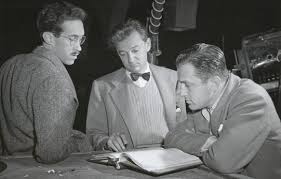
Two of The Hollywood Ten, producer and screenwriter Adrian Scott and director Edward Dmytryk, worked together to complete the pivotal film, CROSSFIRE, just a couple of months prior to being subpoenaed to the HUAC. After several successful films, including this one, this would be their final collaboration. With the screenplay written by John Paxton, it was based on Richard Brooks’ military-influenced crime novel “The Brick Foxhole” which was originally centered on the murder of a homosexual man. Producers Adrian Scott and Dore Schary pitched a new twist to the story. For CROSSFIRE, the bulk of the story unravels the crime post-murder, and the victim is a straight Jewish man.
Schary was concerned the anti-Semitic messaging would be a red flag, gaining unwanted attention from the HUAC. As it turns out, he was right. Interestingly, another film with anti-Semitism themes, Elia Kazan’s GENTLEMAN’S AGREEMENT was released later the same year with even more critical acclaim as that year’s Oscar winner for Best Picture.
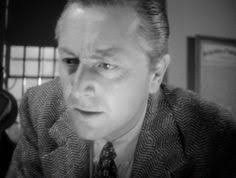
Despite a tight budget and shooting schedule, plus tackling a controversial script under watchful eyes, CROSSFIRE (1947) remains one of RKO’s if not perhaps of any studio’s best film noirs. Beginning with a murder, we are then introduced to Robert Young as the serene, pipe-smoking Finley, who is investigating the case, followed by a slew of potential suspects, friends and foes, of which many are military. We discover that not only was the victim Jewish, but that appears to be the only motivation for his demise. Finlay is hunting down a madman whose rage lurks just below the surface and whose deep bigotry results in murder.
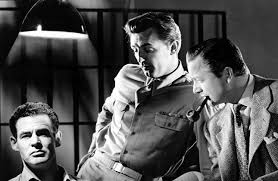
With a headlining trio of three swell Roberts- Robert Mitchum, Robert Ryan, and Robert Young- the casting offers unforgettable performances. Mitchum and Young represent a calm front of tag-teaming good guys, fleshing out demobilized soldiers with possible ulterior motives. Robert Ryan plays Montgomery, the bigoted monster of intermittent restraint of rage, to perfection. A role he performed so well he earned an Oscar nom, that also typecast him for a majority of his career.

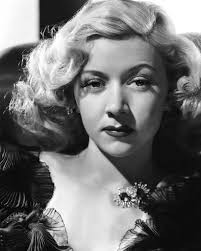
The supporting cast is outstanding, as well. Sam Levene, Paul Kelly, Steve Brodie, Jacqueline White, and Gloria Grahame to name a few. In her first role with RKO following a brief stint at MGM, Grahame is a stand-out and it earned her an Oscar Nomination for Best Supporting Actress. Like Ryan, this film set the mold for many more-naughty-than-nice roles to come. What really drives this film in addition to these performances is the phenomenal cinematography from J Roy Hunt. When one gushes about the glowing beauty of light and dark shadows of a great film noir (as I often do), CROSSFIRE is a perfect example.
For me, one of the most powerful moments comes when a potential witness for the police faces a moral dilemma. He questions whether he should help the police capture Montgomery when he wasn’t directly affected by Monty’s anti-Semitism. Finlay gives him a rather convincing speech about his own Irish grandfather who faced similar treatment as a new immigrant. It’s powerful because Finlay must convince the apathetic soldier that anyone can be the target of bigotry so none of us can afford to look the other way.
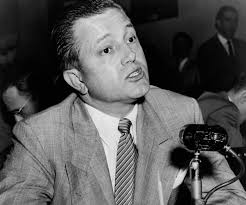
History is a mixed bag for Edward Dmytryk. His talents are rarely disputed. After serving time for his conviction as part of The Hollywood Ten, he experienced regret. He faced the HUAC again in 1951 and recanted his initial defiance. Between his prison time with subsequent blacklisting, and his public distancing from The Hollywood Ten, he made a couple of films in the U.K. Then, Stanley Kramer gave him a chance to transition back to Hollywood. He went on to make many more films in Hollywood for the rest of his career, including winning an Oscar for THE CAINE MUTINY (1954).
Some say he was able to save his career by recanting. Some say he sold out. Fast-forward seventy years later and what have we learned from this? Where does history judge all of those involved in the blacklisting, the HUAC, victims and perpetrators alike? Some have stated “it was a different time” and “people were protecting their jobs to support their families” in sympathy for those that did not defy the HUAC or even named names. Yet many modern-day Americans find it incredulous to believe it took so long to stand up to the HUAC when no actual crimes were committed by those targeted. With hindsight, the wrongs of that ‘Red Scare’ witch hunt seem obvious.
Hateful intolerance remains a presence. We live in precarious times today that reveals an alarming buildup of bigotry and nationalism similar to previous historic levels. Wedged between the nazi horrors revealed in the Nuremberg trials and the onset of McCarthyism, CROSSFIRE’s take on the dangers of bigotry was topical then yet remains relevant to this day.

*This post was my contribution to the CMBA Fall 2017 Blogathon, Banned and Blacklisted, Nov. 15-19, 2017. As a proud member of the Classic Movies Blog Association, I feel privileged to participate and encourage you to read the other entries.


Thanks for a thought-provoking and fascinating look at a fantastic movie in pantheon of film-noir. The film challenges us – as you clearly point out – that we cannot afford to look away. The alarming build-up of nationalism and bigotry, and I would extremism and the roughshod treatment of the keystones of democracy is becoming prevalent throughout the world – perhaps to a lesser degree in Australia (where I am from) but nonetheless present here as well. It’s also fascinating how cinema responded to the blacklists and those that gave people up – of course I’m thinking Kazan and his response via ‘On The Waterfront’ or even to a lesser degree Victor Mature in ‘Kiss Of Death’ as an informer/hero. Look forward to watching ‘Crossfire’ again with some extra things to look for – thanks to your reviews. Best regards, Paul.
LikeLiked by 1 person
One of my all-time favorite noirs.
LikeLiked by 1 person
Thanks, Carol!
LikeLiked by 1 person
A film which intrigues on so many levels and an important symbol of its time. It is also a reminder that people have not changed so very much in the intervening years; more to our shame.
LikeLiked by 1 person
Shame on us, indeed. Thanks for reading, Patricia!
LikeLike
Lara touched on it in her Judy Holliday essay…but it bears repeating: a lot of the Hollywood witch hunt was tainted by anti-Semitism, and as you mentioned it’s not surprising that this amazing noir ended up in the persecutors’ crosshairs. As much as I like GENTLEMAN’S AGREEMENT — I recently bought a Blu-ray copy that I literally got for a steal — I think CROSSFIRE is the better picture, and was certainly more Oscar-worthy.
CROSSFIRE earned Edward Dmytryk his only Oscar nomination, and while I love a lot of his movies from his early B-programmers (CONFESSIONS OF BOSTON BLACKIE, THE FALCON STRIKES BACK) to his later classics like MURDER, MY SWEET, THE SNIPER, WARLOCK, and MIRAGE…I’m in the “he sold out” camp. That’s why it’s always important to separate the artist from the human being. Nice work, Kellee.
LikeLiked by 1 person
I think he sold out, too. And yet, there is the body of his work. There are plenty of Hollywood stars whom I will never agree with their politics. If I was alive during that time… who knows how much I would compartmentalize. Thanks for the kind words, Ivan!
LikeLike
I saw this film for the first time very recently and could not help but be aware of how nothing has changed. Thank you for a thoughtful and insightful post.
LikeLike
Thanks so much, Marsha! It’s truly sad how much some things never change.
LikeLike
Fantastic film. Dmytryk managed star-making performances from Mitchum, Ryan, and Grahame, while telling a riveting story. Between this, Murder My Sweet, and The Sniper, Dmytryk was one of the great filmmaking talents of Hollywood who younger audiences may not know about. Thanks for the review!
LikeLike
Thanks for reading, Danilo! And Murder My Sweet is one of my fave noirs, too. I covered it in my Film Noir class I taught this past January/Feb.
LikeLike
I was thrilled to see you’d signed up for this event and even more so by your choice, which is a perfect fit for your impassioned views, which happen to match mine. Terrific commentary, views and insights on an ever-fascinating movie.
Aurora
LikeLiked by 1 person
We definitely do match in impassioned views! In seeing your choice- I thought the same thing! No surprise, right? Thanks so much, Cubich sister!
LikeLike
Really nice post, Kellee. I like how you weaved in the relevance to today’s climate, a reminder of what the blacklist was all about, and most of all, the story of Edward Dmytryk, who indeed was a complicated person but a talented film-maker. Crossfire is a tense and worthy film, made all the better by the terrific cast.
LikeLiked by 1 person
Thanks so much, Jocelyn! Such a fitting film to revisit these days, eh? Appreciate the kind feedback!
LikeLike
Thanks for spotlighting this important this. Acting is so important in this film. The suspense about whether — or when — Ryan’s character will slip over the edge is made much more tense because of the clear decency of Sam Levene’s character. And both of them are so expertly embodied by the actors, none of whom were top matinee-idol stars — but capable of the finest work.
LikeLiked by 1 person
Thank you for commenting here, Linda. Such an incredible and important film, as you highlight via the actors’ performances and characterizations of right v wrong. Appreciate your input!
LikeLike
A wonderful article about a powerful film that should be required viewing for anyone who wants to understand the blacklist. It also confronts the audiences with their own prejudices, which is somewhat rare in mainstream films made today.
LikeLike
Ivan brings up a good point about separating the artist from his personal life. I have always done that or at least try to. This is so relevant today with all the inappropriate sexual behavior of so many coming to light. Crossfire is a powerful film with as you mention many wonderful performances.
LikeLike
Your article is great, especially those last paragraphs. Crossfire is a very good film, and the sequence you mentioned is unforgettable.
The point of learning history is exactly this: not making the same mistakes. Unfortunately, the majority chooses to forget and ignore the past.
LikeLike